|
|
|
Sort Order |
|
|
|
Items / Page
|
|
|
|
|
|
|
| Srl | Item |
| 1 |
ID:
167644
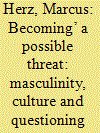

|
|
|
|
|
| Summary/Abstract |
A debate on masculinity and immigration rose across Europe in 2015 after an incident with sexual harassments taking place in Cologne, Germany. The incident refuelled a debate positioning unaccompanied young men as a possible threat. This article is based on a research project where we during this time ethnographically followed 20 young men, having arrived in Sweden as ‘unaccompanied’ minors. The aim is to examine how the young men themselves talk about, reflect on and negotiate masculinity and gender during this period. The article concludes that masculinity cannot be approached as something stable easily being inherited or transferred from one’s origins. One difference for ‘unaccompanied’ young men is how conflicts or tensions emerging in relation to issues of gender and masculinity tend to be interpreted differently, and publicly, putting the young men in a ‘gendered situation of questioning’.
|
|
|
|
|
|
|
|
|
|
|
|
|
|
|
|
| 2 |
ID:
167643
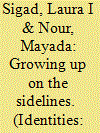

|
|
|
|
|
| Summary/Abstract |
By examining the experiences of the children of Palestinian collaborators whose families have relocated to Israel, this study explores how youth negotiate self within the context of marginalisation and cultural dislocation. Due to the actions of their parents, the research participants have become outsiders and outcasts in their Palestinian communities of origin, outsiders in Israel, and outsiders among Israeli-Arabs. Based on qualitative, in-depth interviews with 11 Palestinian male youths, we describe and analyse the experience of identity negotiation in the context of fear and their families’ past deceit. Our findings highlight that the youths’ identities are negotiated by engaging in a dialogue of self on belonging and not belonging that is based on visions of their past, present and future selves. This is accompanied by a forced dialogue with others, explaining who they are in order to fit in with the ‘audience’, a presentation that is then acted out.
|
|
|
|
|
|
|
|
|
|
|
|
|
|
|
|
| 3 |
ID:
167645
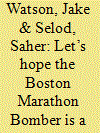

|
|
|
|
|
| Summary/Abstract |
This paper examines public discourse on race, whiteness and Muslims through an in-depth exploration of an online media controversy following the 2013 Boston Marathon bombings. On 16 April, the day after the attacks, the liberal magazine Salon.com published David Sirota’s article, ‘Let’s Hope the Boston Marathon Bomber is a White American’. A firestorm of commentary followed, with conservatives defending the profiling of Muslims, and accusing Sirota of anti-white racism. Anchored in questions of race, racism and Muslims and marked by a sharp partisan polarisation, these discussions intensified after 18 April, when the Tsarnaev brothers were identified as the perpetrators. The ensuing debate surrounding the racial identity of the Tsarnaevs displays how Muslim racialisation occurs and operates within a conservative discourse strongly committed to a colour-blind ideology. Our paper moves beyond this affirmation of literature on Muslim racialisation and sets this process within a relationally constructed and performative white racial identity.
|
|
|
|
|
|
|
|
|
|
|
|
|
|
|
|
| 4 |
ID:
167641
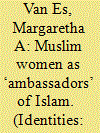

|
|
|
|
|
| Summary/Abstract |
This article explores the efforts of Dutch Muslim women who try to break the ‘oppressed Muslim woman’ stereotype by monitoring their own behaviour in everyday interactions with members of the non-Muslim ethnic majority. In representing themselves as modern and emancipated, they try to change the dominant image of Muslim women in Dutch society, and thus also that of Islam. Based on interviews and archival material, I demonstrate that initially this strategy was mostly adopted by Dutch converts to Islam, and later also by ‘born’ Muslim women. Why do more and more Muslim women turn themselves into ‘ambassadors’ of Islam? And what are the costs of this form of self-essentialization? This article demonstrates the usefulness of studying self-representations of minority groups in the light of existing stereotypes, arguing that Muslim women’s self-representations should be seen as part of a politics of belonging.
|
|
|
|
|
|
|
|
|
|
|
|
|
|
|
|
| 5 |
ID:
167646


|
|
|
|
|
| Summary/Abstract |
Shepherds have a particular place in the history and culture of Romania. For centuries they have had rights to graze their sheep in public pastures and manage their flocks using traditional methods. Changes at the national and European level have threatened this way of life and provoked protest, most recently in December 2015 over plans to limit sheepdog numbers and restrict winter grazing rights. This article draws on interviews with participating and non-participating shepherds to examine the motivations behind the protest action and its relation to their position in contemporary society. The findings suggest how marginalised groups in society are able to draw on folk histories and cultural identities in the formulation of contentious politics in defence of their interests. The post-communist setting of the protests also highlights the persistence of traditional practices during a period of social and political upheaval.
|
|
|
|
|
|
|
|
|
|
|
|
|
|
|
|
| 6 |
ID:
167642
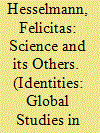

|
|
|
|
|
| Summary/Abstract |
This article investigates the current discourse about scientific misconduct from a postcolonial perspective. It traces the development of a causal story about scientific misconduct, blaming misconduct on so-called foreign scientific cultures said to be most prevalent among developing countries. The paper attempts to show how the discourse on misconduct is structured by themes and logics of coloniality as well as diverges from them, exhibiting shifting categorisations and images of the Other, which oscillate between the Other as a backwards savage and the Other as an advanced machine. Such contradictory categorisations will be argued to be both interpretable as movements to abandon prevailing ideologies of efficiency and progress within science and to make science more inclusive as well as means to uphold and re-establish existing patterns of coloniality in the face of historical changes both within and outside of academic research.
|
|
|
|
|
|
|
|
|
|
|
|
|
|
|
|
|
|
|
|
|